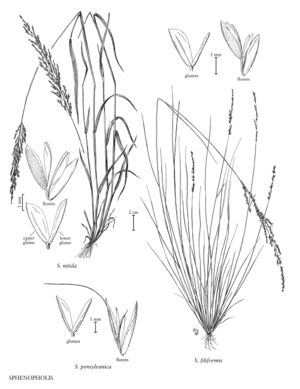Difference between revisions of "Sphenopholis nitida"
FNA>Volume Importer |
FNA>Volume Importer |
||
| Line 8: | Line 8: | ||
|name=Trisetum pensylvanicum | |name=Trisetum pensylvanicum | ||
|authority=(Spreng.) Trin. | |authority=(Spreng.) Trin. | ||
| + | |rank=species | ||
}} | }} | ||
|hierarchy=Poaceae;Poaceae subfam. Pooideae;Poaceae tribe Poeae;Sphenopholis;Sphenopholis nitida | |hierarchy=Poaceae;Poaceae subfam. Pooideae;Poaceae tribe Poeae;Sphenopholis;Sphenopholis nitida | ||
| Line 20: | Line 21: | ||
-->{{Treatment/Body | -->{{Treatment/Body | ||
|distribution=Conn.;N.J.;N.Y.;Del.;D.C;W.Va.;Fla.;Mass.;R.I.;La.;Tenn.;N.C.;S.C.;Pa.;Va.;Ont.;Ala.;Ark.;Vt.;Ill.;Ga.;Ind.;Md.;Tex.;Ohio;Mo.;Mich.;Miss.;Ky. | |distribution=Conn.;N.J.;N.Y.;Del.;D.C;W.Va.;Fla.;Mass.;R.I.;La.;Tenn.;N.C.;S.C.;Pa.;Va.;Ont.;Ala.;Ark.;Vt.;Ill.;Ga.;Ind.;Md.;Tex.;Ohio;Mo.;Mich.;Miss.;Ky. | ||
| − | |discussion=<p>Sphenopholis nitida grows in moist to dry, deciduous and coniferous forests, on clay or silt banks and slopes, at 0-1200 m, in southern Ontario and the eastern United States. It can be confused with occasional forms of S. obtusata that have somewhat scabrous distal lemmas, but S. nitida has broader lower glumes.</p> | + | |discussion=<p><i>Sphenopholis nitida</i> grows in moist to dry, deciduous and coniferous forests, on clay or silt banks and slopes, at 0-1200 m, in southern Ontario and the eastern United States. It can be confused with occasional forms of <i>S. obtusata</i> that have somewhat scabrous distal lemmas, but <i>S. nitida</i> has broader lower glumes.</p> |
|tables= | |tables= | ||
|references= | |references= | ||
| Line 29: | Line 30: | ||
-->{{#Taxon: | -->{{#Taxon: | ||
name=Sphenopholis nitida | name=Sphenopholis nitida | ||
| − | |||
|authority=(Biehler) Scribn. | |authority=(Biehler) Scribn. | ||
|rank=species | |rank=species | ||
| Line 36: | Line 36: | ||
|basionyms= | |basionyms= | ||
|family=Poaceae | |family=Poaceae | ||
| − | |illustrator=Linda | + | |illustrator=Linda Ann Vorobik;Hana Pazdírková |
| + | |illustration copyright=Utah State University | ||
|distribution=Conn.;N.J.;N.Y.;Del.;D.C;W.Va.;Fla.;Mass.;R.I.;La.;Tenn.;N.C.;S.C.;Pa.;Va.;Ont.;Ala.;Ark.;Vt.;Ill.;Ga.;Ind.;Md.;Tex.;Ohio;Mo.;Mich.;Miss.;Ky. | |distribution=Conn.;N.J.;N.Y.;Del.;D.C;W.Va.;Fla.;Mass.;R.I.;La.;Tenn.;N.C.;S.C.;Pa.;Va.;Ont.;Ala.;Ark.;Vt.;Ill.;Ga.;Ind.;Md.;Tex.;Ohio;Mo.;Mich.;Miss.;Ky. | ||
|reference=None | |reference=None | ||
| Line 42: | Line 43: | ||
|publication year= | |publication year= | ||
|special status= | |special status= | ||
| − | |source xml=https:// | + | |source xml=https://jpend@bitbucket.org/aafc-mbb/fna-data-curation.git/src/f50eec43f223ca0e34566be0b046453a0960e173/coarse_grained_fna_xml/V24/V24_886.xml |
|subfamily=Poaceae subfam. Pooideae | |subfamily=Poaceae subfam. Pooideae | ||
|tribe=Poaceae tribe Poeae | |tribe=Poaceae tribe Poeae | ||
Revision as of 21:25, 16 December 2019
Culms 30-80 cm. Sheaths pubescent or the upper sheaths glabrous, sometimes scabridulous; ligules 1-2 mm; blades 2-15 cm long, (1)2-5(7) mm wide, flat to slightly involute, sometimes pubescent, flag leaf blades scabridulous. Panicles 6-20 cm long, 1-5 cm wide, nodding to erect, spikelets loosely to densely arranged. Spikelets 2.5-5 mm. Lower glumes at least 1/3 as wide as the upper glumes; upper glumes 2-3.2 mm, obovate, rarely subcucullate, width/length ratio 0.22-0.38; lowest lemmas 2.1-3.8 mm, smooth on the basal 1/3-1/2, scabrous distally, unawned; distal lemmas scabrous on the sides, usually unawned, rarely awned, awns 0.1-1 mm; anthers (0.5)1-2 mm. 2n = 14.
Distribution
Conn., N.J., N.Y., Del., D.C, W.Va., Fla., Mass., R.I., La., Tenn., N.C., S.C., Pa., Va., Ont., Ala., Ark., Vt., Ill., Ga., Ind., Md., Tex., Ohio, Mo., Mich., Miss., Ky.
Discussion
Sphenopholis nitida grows in moist to dry, deciduous and coniferous forests, on clay or silt banks and slopes, at 0-1200 m, in southern Ontario and the eastern United States. It can be confused with occasional forms of S. obtusata that have somewhat scabrous distal lemmas, but S. nitida has broader lower glumes.
Selected References
None.
